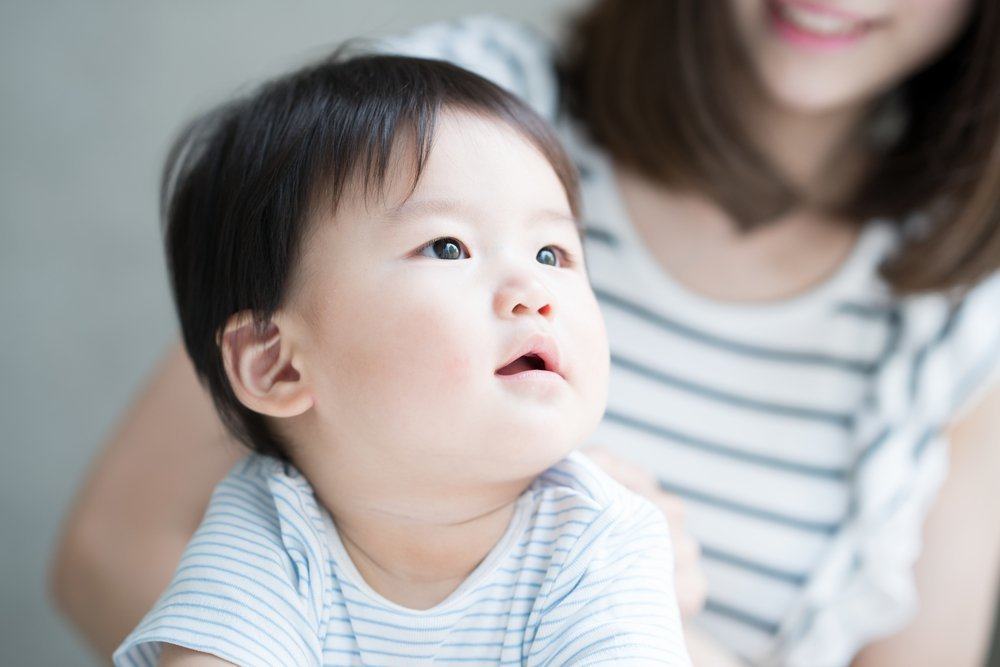Contents:
- Medical Video: Teaching Your Baby How To Speak (Baby Health Guru)
- The importance of parents talking with baby language
- When children smile and pay attention to you
- Imitate the words of the baby
- Talk to children often
- When does the baby start learning to speak?
- Ages 1-3 months
- Ages 4-7 months
- 8-12 months of age
Medical Video: Teaching Your Baby How To Speak (Baby Health Guru)
When feeling thirsty, hungry or sick, babies cannot express what they feel, they can only cry to attract your attention. However, there are times when the baby speaks in his own language to invite you to communicate, and you will usually immediately respond to this little babble in the same language as him. Sounds really funny, but is it baby's language orbaby talk can this help your child quickly learn to talk or actually inhibit children's language learning?
The importance of parents talking with baby language
For one year since the baby was born, there must be lots of new things that he tried to learn, one of which was how to communicate. When the baby smiles, laughs, or just talks about calling you by name 'Mama' or ‘Bubu’, that's your own way to invite you to chat.
Through baby talk or the language of the baby, the little one hopes you will answer the chaos again by smiling, singing, or reading a book. Communicating with the baby is an important phase in the early days of his birth.
You should focus on developing your child's speaking and speaking skills because it is related to many things. Starting from the development of the ability to read, write, and the inner bond with the little one later in the future.
When children smile and pay attention to you
Long before your child can speak fluently, the baby is actually able to understand the meaning of the words you say in general. Not only that, the baby also absorbs an understanding of the tone of voice, so he knows when you are happy or angry.
Well, therefore, it is important for parents to support the child's efforts to communicate early on by giving him full attention. Here are ways you can do it.
- Give your child the time and attention when he talks, no matter how busy you are. Listen to the chaos with affection, respond to the words, even though you don't understand what they mean. This method will provoke your child to continue talking.
- When a child is laughing, look at his face enthusiastically. Don't turn, cut, or talk to other people. You may also laugh so he feels heeded.
- Smile often in front of your little one, especially when he starts talking in a typical baby language.
- One thing that is not less important is patience. Yes, especially the patience to interpret every sign that your child gives in his non-verbal communication. Even meaningless facial expressions and chaos are signals that your child feels happy or even upset.
Imitate the words of the baby
Since the beginning the child learns to speak, the language of the babymust walk both ways. That is, when the baby makes a sound out of his mouth, you are expected to be able to reply to the words in your own way. One of them is to imitate what the baby says, no matter how messy it is.
Even though it sounds funny, baby talk will make your child feel important, loved and cared for by you. Try applying the following things to start communicating:
- Be like a mirror. Take a smile or pout like when a child does this.
- Give the best response possible, even if you don't understand what your little one is trying to say.
- Teach children how to communicate like adults, that is by feeding back every word so that communication becomes two-way and continuous with each other.
- Imitate funny jokes. For example, when the baby said ‘Gu gu gu’ or ‘Pa pa pa’, imitate the words and then wait until he starts to emit another mess for you to reproduce again.
- In addition to chaos, gestures or body language is also a way for your child to communicate. You can mimic the way you move your hands or shake your head as a signal that you understand what they mean.
- Say the words clearly and correctly like an adult. If your child says "aju" to say "fall", you repeat the words with the correct words ("fall"), not the wrong words ("aju"). When you repeat the wrong words, the child will imitate the wrong words and not know what is right.
Talk to children often
The baby is not only fussy, but he is also a good listener. He was very enthusiastic when he heard his mother talking, especially if you invited him to communicate in a soft and happy voice.
Babies learn to talk by imitating the words that they hear around them. That means, the more often you invite your child to talk, the sooner the child will master speaking and speaking skills.
However, there are some things that parents often misunderstand when trying to communicate with babies. For example, many adults use special tone of voice when trying to speak baby, namely by raising the voice with an expression that is too excessive. In fact, you can simply answer the words in a normal tone of voice like when you talk to other adults.
Baby language actually imitating the voice and expression of women, because babies associate women's voices with comfort and love. Although there are many opinions saying that baby's language orbaby talk not good for children's language development, but really baby talk will not inhibit or interfere with the baby's learning to speak as an adult later on.
You can teach your child the correct words by repeating them many times until the child starts to hear the word. For example, say the word "bottle" when giving him a milk bottle. Or, you can point to yourself while saying “Mama“ every time he sees your eyes.
Apply it wherever and whenever, both when breastfeeding, wearing clothes, or bathing your little one. Always connect a sound with an object or daily activities so that the baby easily absorbs many new things at once. For example, you can associate a tub full of water or a small yellow duck toy with “bath".
When does the baby start learning to speak?
Some babies are able to say a few words when they are one year old. But there are also children who just started talking when they were 18 months old. Speech development in children is very different.
If the child is late talking, there might be something wrong with the way you teach it communication. The following tips for children to quickly absorb the words around them.
Ages 1-3 months
These are the times when a baby likes to hear you speak and respond to your words by smiling or waving his little hands. Usually when you are 2 months old, your baby will start saying ‘Ooh’ and other funny cerusas. At this age, you may begin to read stories or listen to music to help stimulate your child's brain development.
Ages 4-7 months
At this age, babies have begun to understand that baby languagehas meaning in your eyes. He looks forward to your reaction to each of his stories. For this reason, babies begin to fuss because they are experimenting with various sounds and intonations.
He began to raise or lower his tone of voice when speaking, just like an adult when asking or emphasizing certain sentences.
8-12 months of age
This is the 'golden age' when children start calling you by name “Mama‘”or “daddy“ for the first time. At first it might just be a coincidence that he could call his parents. However, if you can give a special reaction when he says “Mama“, then your child will start to like to mention the word.
Smile often and look at the baby's face when teaching your child a vocabulary. For example, you want to teach him to get to know the word 'eat', then you have to repeat the word throughout the day so that your baby's brain is quickly absorbed.
If your child does not talk until he is more than one year old, then it is better to immediately see a doctor. At the age of one year, the baby should be able to respond to the meaning of the word 'not', get to know his own name, or come to you when you wave and say 'here'.
Although the language development of each child is different, checking the child to the doctor as early as possible is the best prevention to find out if your child has difficulty speaking.













